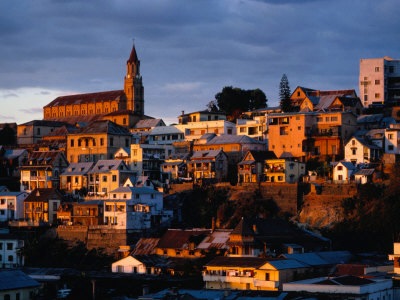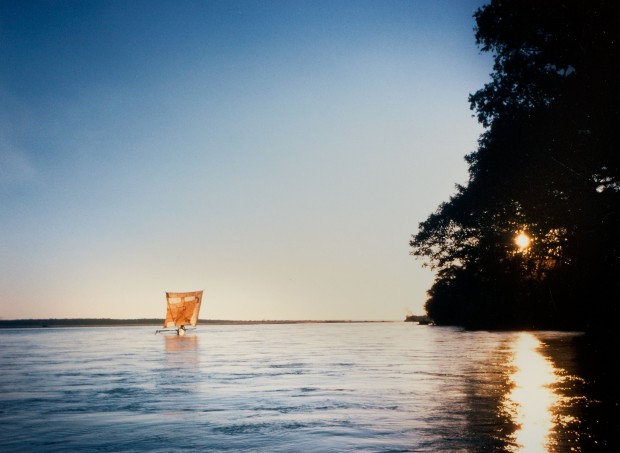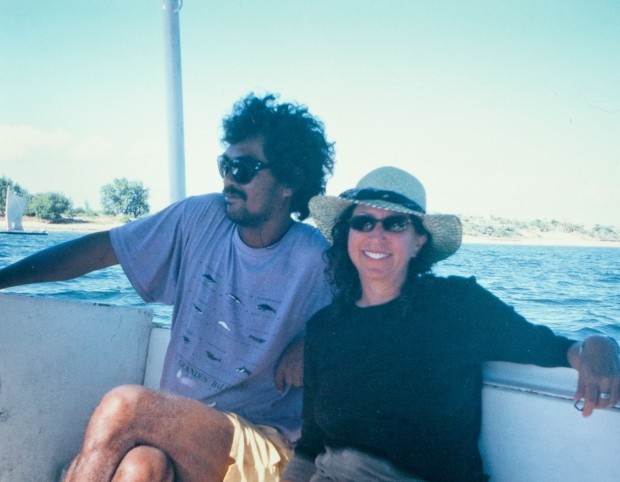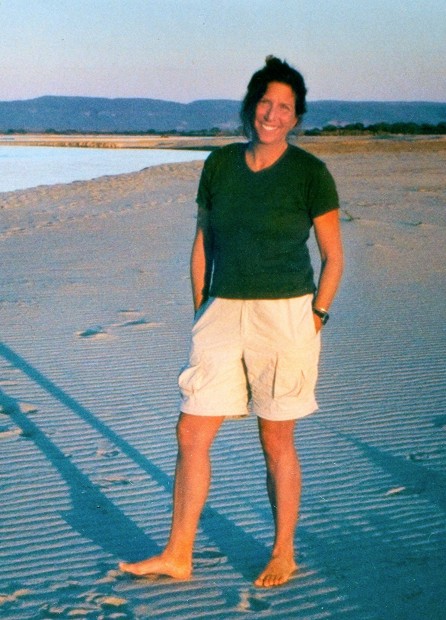The Day I Stopped Being an Environmental Writer by Susan Zakin
categories: Cocktail Hour
7 comments
 I’ve long been a fan of Susan Zakin’s work, starting with her great book on Earth First!, Coyotes and Town Dogs, and continuing with the essay of hers we published in Ecotone. Below she declares her independence from eco-writing, and she proves it with her new novel, The Afterlife of Victor Kamara. You can read an excerpt here.
I’ve long been a fan of Susan Zakin’s work, starting with her great book on Earth First!, Coyotes and Town Dogs, and continuing with the essay of hers we published in Ecotone. Below she declares her independence from eco-writing, and she proves it with her new novel, The Afterlife of Victor Kamara. You can read an excerpt here.
The Day I Stopped Being an Environmental Writer
The day I stopped being an environmental writer, I was on a river in Madagascar.
Stop. I hate reading stories like this: the Patagonia catalog, Barry Lopez-Gretel Erlich School of Upper Middle Class Environmentalists Finding Meaning on a $10,000 Trip to a Place No Regular Person Can Afford to Travel.
But there I was, and I wouldn’t mind being there again. I was in Madagascar on a fellowship that I’d applied for during a major case of burnout. After writing my first book, I had been trying to sell the extinction crisis to New York editors for almost ten years, and my career was in the toilet. “I don’t really like sleeping outside,” an editor at The New York Times Magazine confessed to me. “But I just bought these great rock-climbing shoes – you know the ones with the sticky soles?”
That was the scene with magazines. When it came to selling books, the comments usually ran like this: “Susan is clearly a talented writer. Alas, we have never done well with environmental books. If she could find another subject…” (Why, I wonder, do rejections always contain the pretentious word alas?)
In desperation, I applied to a foundation that trained journalists in the developing world. In Antananarivo, Madagascar’s capital, I learned fairly quickly that I was superfluous. The local reporters knew what they were doing; they just weren’t allowed to do it. The president-for-life kept a tight grip on the media and my Malagasy colleagues risked a beating or worse if they offended him. My job was to provide moral support, and accompany them when they interviewed people. As an American, I could intimidate their sources into talking. I was well-suited to the job. I rather enjoyed intimidating people, especially bad guys.
After a while, life felt seamless. Antananarivo was faded elegance at its most charming, and the Malagasy people were extraordinary: warm, genuine, and precisely calibrated to nuance. I lived in a hotel, like Eloise. I ordered room service. At night, I ate in the dining room, where I met dashing gem smugglers. I became friends with one of Madagascar’s most successful businesswomen, a principled, chic, and utterly gorgeous woman who is one of my best friends to this day. Using traditional methods of study – a French boyfriend – my language skills improved.
 In Madagascar, I learned that nature and culture were not separate, one pure and the other sinful. After seeing a rare mouse lemur in its solitary nest and, not far away, the owl that hunts it, I emerged from a spiny forest to hear the night watchman playing a delicate stringed instrument under a soapstone moon. The music, the lemur, the predatory owl, the man and the moon; all were of a piece.
In Madagascar, I learned that nature and culture were not separate, one pure and the other sinful. After seeing a rare mouse lemur in its solitary nest and, not far away, the owl that hunts it, I emerged from a spiny forest to hear the night watchman playing a delicate stringed instrument under a soapstone moon. The music, the lemur, the predatory owl, the man and the moon; all were of a piece.
Like Baudelaire (“luxe, calme, et volupte…” he wrote of his time on the island) I found a better way of life in Madagascar.
When I accepted the fellowship, I insisted that the foundation allow me to spend two weeks on a river trip through the island’s arid southwest. Very few people rafted the Mangoky River, but I had connected with an American river guide and his Malagasy partner, Gerard Ravoajanahary, a former World Wildlife Fund staffer.
 We fell into the rhythm of the river, life measured by the slow but inexorable current — and Gerard smacking his paddle on the surface of the water. This was necessary to frighten the crocodiles when we had to jump out of the boat to pee. All the women wanted to be in Gerard’s boat because he was so charming, so we stopped twice as often as the other boat. We also took longer to leave in the morning: cries of “I forgot to put on my sunscreen!” and “Wait, I need my bandanna!” were so routine that Gerard took to starting our day by saying, in mock drill sergeant tones: “Ladies! Arrange yourselves!”
We fell into the rhythm of the river, life measured by the slow but inexorable current — and Gerard smacking his paddle on the surface of the water. This was necessary to frighten the crocodiles when we had to jump out of the boat to pee. All the women wanted to be in Gerard’s boat because he was so charming, so we stopped twice as often as the other boat. We also took longer to leave in the morning: cries of “I forgot to put on my sunscreen!” and “Wait, I need my bandanna!” were so routine that Gerard took to starting our day by saying, in mock drill sergeant tones: “Ladies! Arrange yourselves!”
In some ways, though, Madagascar’s southwest was not so different from the American southwest I had left behind. On the remote Mangoky River, streamers of smoke accompanied us like wraiths. The forest was burning. We saw smoke nearly every day, sometimes more than once. Slash and burn farming was Madagascar’s version of suburban sprawl, the final solution, napalm. As far back as 1881, Queen Ranavalona II had banned slash-and-burn agriculture, but then as now, the warnings were ignored.
Smoke trailed us everywhere, but we saw very few people. In ten days, we passed no more than a few dozen. A lone man poled a pirogue rigged with sails made of old rice sacks that shone gold in the sun. Naked men bathing at the shore grinned and waved at us. We waved back, trying not to look. We stopped at a sandy spit full of children. I braided a little girl’s hair: she gave me her address and made me promise to send her a postcard.
The illusion is over, say the Mexicans when a love affair ends. On our next to last day, we reached the outskirts of a village. As we slid onto the shore, we were greeted by a woman and her young son. The woman had a pet lemur draped around her neck. The lemur was alive, but barely. The mangy lemur reminded me of one of the creepy-looking fur pieces worn by old ladies on the 79th Street crosstown bus when I was a kid: a fox with its jaws clamped on its own tail.
Maybe it was the cumulative effect. For ten days, we had traveled a corridor of rare birds, bats, and vanilla plants. Smoke scrolled beside us, silent but constant, a reminder that the world was closing in. I had not exactly ignored it, merely noted its presence.
Now it reached me. I had traveled around the world, and here I was, on the 79th Street bus.
If the ecologist Raymond Dasmann was right and World War III was industrial man’s war on nature, that particular guerre was fini. Not for everyone. Many people cared about nature for its own sake, whether it was beautiful or not. These were the environmentalists of the future: people who got excited about “sustainability” or “trading pollution credits.”
For me, it had always been about something else. Aesthetics, I suppose. Transcendence, the old Emersonian saw. That part was over. Fini.
I left in June. From the U.S., I followed the news of Madagascar’s contested presidential election. A stalemate: the old president wouldn’t give up power, and the younger insurgent candidate refused to concede the election. While they bickered, an estimated 7,000 children died because road blockades were stopping the rice harvest from reaching markets.
In September, the World Trade Centers fell. Nearly three thousand people died in the attacks.
When I saw the profiles of the victims in The New York Times, I felt nothing but anger. Not anger at Al Qaeda. Anger at us. Who was writing profiles of the children who died in Madagascar? Who was talking to their families, finding out what kind of food the kids liked, whether they cared about sports, or flowers, or if one of the girls was missing a front tooth that left a gap when she smiled?
In the midst of the Malagasy standoff, a boatload of French mercenaries tried to invade. I think there were 60 of them. Brazen to the point of being comical, they were turned back before reaching shore. I couldn’t stop thinking about the old Peter Sellers movie “The Mouse That Roared.” When the tiny Duchy of Grand Fenwick, whose sole export was Pinot Grand Fenwick wine, was threatened by economic collapse, the country’s leaders decided to invade the United States. Armed only with bows and arrows, they were hoping to be defeated so they could receive U.S. largesse, a la the Marshall Plan. In a series of coincidences and misunderstandings, Grand Fenwick wins.
This weird childhood association led to research on mercenary soldiers, and eventually to Sierra Leone, the poster child for failed states, a country that many people feel benefited from an incursion of mercenaries in the late 1990s.
For the next few years, my life was steeped in magic, military coups, cannibalism. I sold my house, and spent a month in Sierra Leone, contracting the usual gringa mystery disease (in my case, probably Lassa virus). I spent three years in The University of Arizona’s MFA program in fiction, the only way I could deprogram myself from the flat narrative voice of journalism. I workshopped my novel-in-progress with African writers at the Summer Literary Seminar in Kenya, to assuage my worries that as a non-African, I might not get it right.
I married a Kenyan guy, brought him to the U.S., watched him struggle, and thought more about identity. I had felt the boundaries of my personality shifting when I lived with him in Kenya; now I wondered if it was right to force him to adapt to our cold and impersonal culture. As I wrote my main character, a young West African army lieutenant who takes power in a military coup, and ten years later, is living a quotidian existence as a soccer dad in suburban Virginia, I asked: Who is Victor Kamara? The warlord who stole from his people and ordered his opponents shot? Or the husband and father with a graduate degree in peace and reconciliation studies?
I found the answer, the one Walt Whitman gave us: I contain multitudes.
I love writing fiction. It’s not that I don’t care about politics anymore. I do. But differently.
Madagascar: the music, the lemurs, the bats, the moon. Gerard doing his Johnny Hallyday imitation around the campfire. All of you released me from the need to save the world right now, right here.



Excellent post that left me with a few extra arrows in my quiver. Nice graphics, too. Thanks again.
Wonderfully rich post, Susan. I know what you mean about fiction vs. journalism. But you might find in time that fiction has given you back something for your journalism . . .
You’re absolutely right. I’ve been doing a lot of journalism lately, both new stuff and revisions of old pieces to post on Byliner (whenever they actually get around to setting up my page.) The work is much more cohesive, better-written, less jumpy. I’m a huge, huge believer in the idea that the Balkanization of these fields (journalism & fiction/creative nonfiction) is bad for both.
But I’m dying to get back to fiction!
Fabulous! Absolutely fabulous! I think that Im still an ardent enviro but I am sick of all the sheikness of it. Goddamm, throw a piece of garbage out on the road to mecca.
Susan, really enjoyed this piece. The writing is wonderful, your life so interesting and brave. Especially like the intimidating of bad guys.
Thanks for the note, Debora! Brave, or foolhardy, I’m never sure. I tend to go for it, but panic halfway through. By then, it’s too late to turn back…I hope you’ll subscribe to my blog: http://susanzakin.com/blog/
Thanks again!
Yes, I will. In fact I just read your Civility piece. Right on! I must tell you that years ago I saw a C-Span talk. Richard Dreyfus on Media Issues and Hollywood, presented to the National Press Club, Feb. 2006. It gave me chills–so many strong points, one being the great reminder that The People are the sovereign in this country, and that respectful and respectable public discourse is our American right and duty. You might enjoy checking this out. Richard Dreyfus is a great speaker, and this speech was SO well-written, covered a lot of civic territory and was interesting and important all the way through.